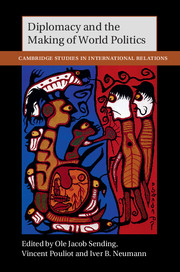Book contents
- Frontmatter
- Contents
- Contributors
- Acknowledgments
- Introduction
- Part I Making of international institutions
- 1 International law and the politics of diplomacy
- 2 Diplomacy, war, and world politics
- 3 The practice of permanent representation to international organizations
- Part II Making international cooperation
- Part III Diplomacy as a contested terrain
- Conclusion: Relationalism or why diplomats find international relations theory strange
- Bibliography
- Index
- Cambridge Studies in International Relations
3 - The practice of permanent representation to international organizations
from Part I - Making of international institutions
Published online by Cambridge University Press: 05 September 2015
- Frontmatter
- Contents
- Contributors
- Acknowledgments
- Introduction
- Part I Making of international institutions
- 1 International law and the politics of diplomacy
- 2 Diplomacy, war, and world politics
- 3 The practice of permanent representation to international organizations
- Part II Making international cooperation
- Part III Diplomacy as a contested terrain
- Conclusion: Relationalism or why diplomats find international relations theory strange
- Bibliography
- Index
- Cambridge Studies in International Relations
Summary
– Negotiating multilaterally you are entering a world of its own.
Nyerges, “How to Negotiate,” 177Multilateral diplomacy has come of age – to the point that it now “incontestably dominates international life,” according to two prominent observers. Everyday global governance is punctuated by a seemingly endless series of regular international meetings dealing with security, trade, finance, the environment, development, and many other issues. A cursory survey of world news returns a large proportion of G20 summits, UN conferences, Security Council meetings, World Trade Organization (WTO) negotiation sessions, Association of Southeast Nations (ASEAN) forums, and other EU councils. In the past few decades, multilateralism – “an institutional form which coordinates relations among three or more states on the basis of ‘generalized’ principles of conduct” – has become the ordinary process by which international relations are conducted. Actors and observers usually think from multilateral diplomacy, much less about its opportunity.
Multilateralism is a political process that keeps evolving over time. For heuristic purposes, it is useful to distinguish among three broad forms of multilateral diplomacy – all of which are currently on the rise. First, there is the rapidly emerging form of “complex multilateralism,” a hybrid configuration of heterodox actors (states, NGOs, IOs, corporations, etc.). The Global Compact exemplifies this new kind of “multiscalar,” “polycentric,” and “diffuse” global governance. Second, the most visible form of multilateral diplomacy is that of summitry, ranging from annual G8 summits to Asia-Pacific Economic Cooperation (APEC) sessional gatherings. These high-level meetings easily catch headlines when they happen, even though their outcomes usually rest on lower-key and often informal transgovernmental cooperation. Third, operating more or less behind the scene (though in a rather formal role) are permanent representatives (PRs), that is, ambassadors posted at various IOs to conduct ongoing negotiations on behalf of member states. Cities such as New York, Brussels, and Vienna host vast numbers of national delegates attached to the UN, the EU, NATO, the Organization for Security and Co-operation in Europe (OSCE), the International Atomic Energy Agency (IAEA), and a plethora of other intergovernmental bodies.
- Type
- Chapter
- Information
- Diplomacy and the Making of World Politics , pp. 80 - 108Publisher: Cambridge University PressPrint publication year: 2015
- 10
- Cited by

